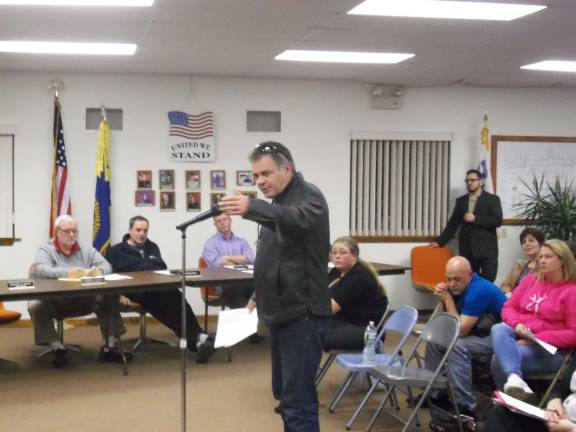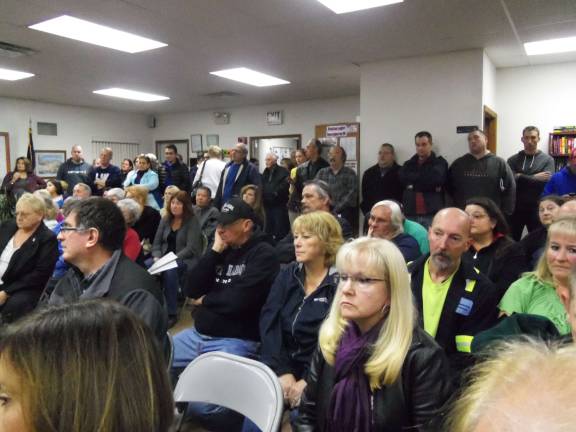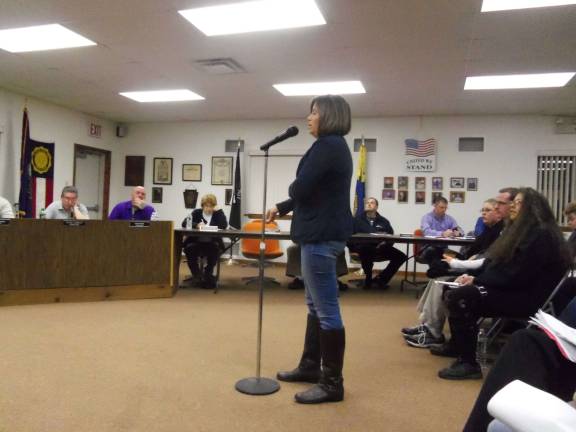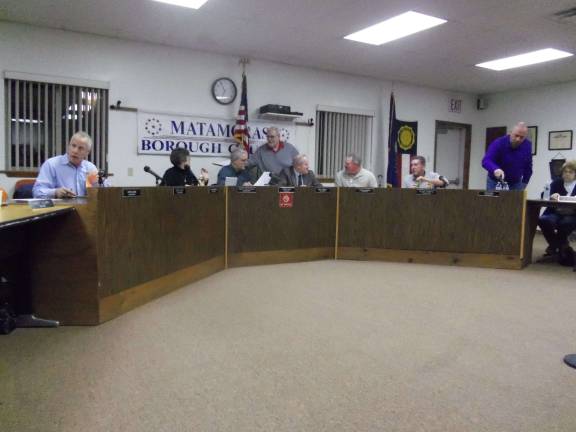Earned income tax tabled for now




By Charles Reynolds
MATAMORAS — If you work in Matamoras, you may be paying more tax next year.
The Matamoras Borough Council held a special comment hearing before its regular meeting on Nov. 5 to discuss a proposed earned income tax of one percent. Although the council tabled the proposal to see if more spending cuts will make the tax unnecessary, it may come back if efforts fail. The tax would be levied to fill a projected $179,000 shortfall in the municipality's upcoming budget year.
The proposed tax would affect Matamoras residents who earn income both inside and outside the borough, which Berkheimer Tax Administrators estimates at about 925 residents, 74 of whom already pay this tax elsewhere. The tax would also affect non-resident workers who earn income in the borough, including service providers, like contractors, and resident and non-resident business owners who would pay on their businesses net income.
Many residents say they had no idea this vote was taking place until practically the last minute. A Facebook campaign — Earned Income Tax for Matamoras Residents! No! — was initiated by resident John Codichini on Oct. 29.
'There has to other alternatives'
More than 75 residents packed borough hall. Council President Joseph Sain began going down the sign-in list to hear comments by each resident. But the meeting often degenerated into back-and-forth conversations between residents and council members. Residents became loud and unruly, and were silenced by a loud voice in the back of the room urging people to be quiet.
Kim Ropke, a former member of the borough council, said she had started a petition asking the council not to pass the tax, getting more than 200 signatures in less than 24 hours. The area has one of the lowest household incomes around, she said.
"People have not even begun to dig out of the recession," she said. "Most don't even have a shovel yet, and we're doing this to them. There has to be other alternatives,” she said.
Ropke stated she's contacted state representatives willing to help with the budget.
Sain said police services are contracted and there difficult to cut. The recent police contract saw an increase in costs to the borough of about $48,926, including a 3 percent raise for all full-time officers. At a joint meeting between Westfall and Matamoras, most residents did not want to see police services cut.
Council members said they do not have a prudent reserve, usually an account covering a municipality's budget for the first several months of the year, and have been taking out a tax anticipation loan to cover this. The council decided to use $160,000 received from the school district for zoning for the new school to pay down the loans so they don't have to take out a new loan for the next budget year.
Jeanie Moore of Matamoras asked if this tax would be above the taxes already being paid and how many residents it would affect. The Berkheimer representative said it was a new tax above and beyond current taxes, and that it would affect about 40 percent of borough residents per the 2010 census.
John Codichini, who created the Facebook event, said many people were coming to Matamoras and abusing the area. And residents were stuck paying increased costs to clean up the town and pay the police and other associated costs with this influx, he said. He joked that maybe they should put up a toll bridge to get those coming in to abuse local neighborhoods to pay their share.
Council member Peter Sigreto asked resident Jack O'Leary, a member of the Delaware Valley school board: "Where do you want us to cut?”
O'Leary said he doesn't ask the council to help him with his budget, and that he's not going to do theirs.
“Do your job,” he said. “I do mine. And I do it very well.”
Later in the meeting O'Leary said that “taxes, any taxes, are counterproductive.”
Several residents brought up all the tobacco stores and asked if a cigarette tax could be instituted. In order for this to be done, it would have to be legislated and approved by the governor. Several townships, including Hanover Township, have tried, but the only one to have gotten this in the state was Philadelphia County.
Other residents suggested a one percent sales tax across the board.
Residents pointed out cost-cutting possibilities. Council member David Clark said that if the council did away with trash pick up — $115,000 in the budget — would residents be willing to pay the estimated $20 a month to have their own garbage collected?
The resounding “yes!” that reverberated throughout the hall gave him his answer.
Many said it would be more fair to get all 2,000 residents involved in the budget rather than put the burden on the 925 residents the earned income tax would affect and the other working class people from outside the area.
Clark proposed that the earned income tax idea be tabled.
Another budget workshop will be held on Tuesday, Nov. 25, at 7 p.m., in the council hall, 10 Ave. I. Council members urged the public to attend to help them with the budget since they were responsible for stopping the tax, which would have sealed up the shortfall problem.
If the workshops result in a balanced budget, officials say, the earned income tax will be scrapped for good. But if the budget cannot be reconciled, council members can still vote on it at a future meeting without making public announcements ahead of time.
Related story: "Smoke shops do not bring prosperity": http://bit.ly/1p3AQQy.